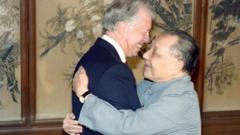On a snowy morning in January 1979, then-President Jimmy Carter welcomed a significant visitor to Washington: Deng Xiaoping, the architect of China's economic reform. This historical meeting marked the first visit of a leader from Communist China to the US, laying the groundwork for a diplomatic relationship that would reshape global dynamics and catalyze China's eventual rise as an economic superpower. Carter's decision to formally recognize China while simultaneously diminishing support for Taiwan remains a defining element of his legacy, as seen in the mixed sentiments his actions have evoked across Asia.
Destiny appeared to play a role in Carter's relationship with China; born on October 1, the same day as the People's Republic was founded, he often mentioned that fate had intertwined their paths. His efforts provided a sign of hope to a country emerging from the shadows of isolation, with Beijing expressing deep gratitude for helping lift China from its 1970s seclusion.
Although Richard Nixon initiated the overture to Beijing, it was Carter who solidified the bond. Following months of secret negotiations, the two nations announced the establishment of formal diplomatic relations, surprising the world and uplifting Beijing's spirits while provoking dismay in Taiwan, reliant on US military backing.
Carter and Deng forged a unique trust through their shared pragmatism, forming a partnership deeply rooted in mutual respect. Their rapport was evident during Deng's visit to the US, which included a touching moment of camaraderie in the Rose Garden and his energetic appearance at a Texas rodeo, which delighted the American public. This personal rapport not only signaled to both nations the return to friendship, but also heralded significant economic collaborations that would follow.
Under Carter's leadership, China received "most favored nation" trade status, fostering economic growth that doubled bilateral trade within a year. In the subsequent decade, both powers benefited immensely from increased cooperation, with China becoming a vital trade partner for the US and the world.
Even after leaving office, Carter continued to nurture ties with China through initiatives like his nonprofit, The Carter Center. His dedication to humanitarian efforts and grassroots democracy won him admiration among the Chinese people, a stark contrast to the more formal demeanor of many Chinese politicians.
As time passed, however, Carter's relationship with Chinese leaders became strained, particularly as Xi Jinping took power. In personal visits, he often encountered diplomatic snubs reflecting deteriorating US-China relations, which contributed to his discontent and concern regarding the potential for a new Cold War.
In retrospection, historians argue that while Carter's engagement with China was well-intentioned, it inadvertently set the stage for growing tensions between nations. Carter’s hope was for a world united by peace and collaboration, encapsulated in his call for leaders to build joint futures for humanity, affirming the enduring necessity of friendship amidst evolving challenges.

















